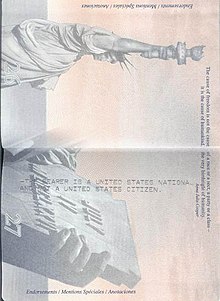
American Samoa consists of a group of two coral atolls and five volcanic islands in the South Pacific Ocean of Oceania.[1] The first permanent European settlement was founded in 1830 by British missionaries, who were followed by explorers from the United States, in 1839, and German traders in 1845.[2] Based upon the Tripartite Convention of 1899, the United States, Great Britain, and Germany agreed to partition the islands into German Samoa and American Samoa.[3] Though the territory was ceded to the United States in a series of transactions in 1900, 1904, and 1925, Congress did not formally confirm its acquisition until 1929.[3][4] American Samoans are non-citizen nationals of the United States. Non-citizen nationals do not have full protection of their rights, though they may reside in the United States and gain entry without a visa.[5] Territorial citizens do not have the ability for full participation in national politics[6] and American Samoans cannot serve as officers in the US military or in many federal jobs, are unable to bear arms, vote in local elections, or hold public office or civil-service positions even when residing in a US state.[7] Nationality is the legal means in which inhabitants acquire formal membership in a nation without regard to its governance type.[8] Citizenship is the relationship between the government and the governed, the rights and obligations that each owes the other, once one has become a member of a nation.[9]
- ^ Fenner, Speicher & Gulick 2008, p. 305.
- ^ Kennedy 2013, pp. 1865–1866.
- ^ a b Whiteman 1967, p. 116.
- ^ Yeung 2016, p. 5-6.
- ^ Villazor 2017, p. 1673.
- ^ Lin 2019, p. 1262.
- ^ Vlahoplus 2018, pp. 401–402.
- ^ Villazor 2017, pp. 1707–1708.
- ^ Kerber 1997, p. 834.
